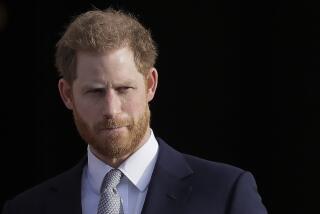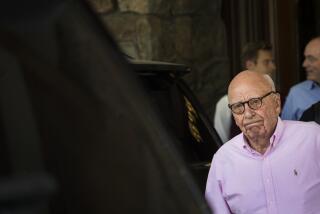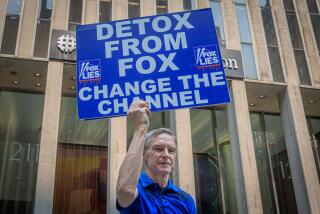News Corp.’s Rupert Murdoch gets mixed reviews
The question heading into the historic parliamentary hearing in London was whether Rupert Murdoch and his son James could pull off the balancing act of being contrite as well as in control.
For the elder Murdoch, a strong performance was critical in cementing his legacy. For James Murdoch, his answers could demonstrate whether he should remain a top executive at News Corp. and eventually succeed his father as chief executive.
Reaction was mixed to the performance of the two men who appeared Tuesday before a parliamentary committee to account for allegations of widespread phone hacking of celebrities and crime victims by reporters at the company’s now shuttered News of the World tabloid.
Video: Murdoch hit with foam pie
Sometimes cupping his hand over his ear to hear questions and forgetting names of employees, Rupert Murdoch came across as every bit the 80-year-old executive who no longer is deeply involved in the day-to-day affairs of his far-flung company.
“At times he looked his full age. It took him awhile to respond to questions and he seemed lost at times,” said Sydney Finkelstein, Dartmouth College business professor and author of the book “Why Smart Executives Fail.”
“But you also could still see that all-dominant, bombastic leader who doesn’t have to answer to anyone,” Finkelstein said. “He was banging on the table, interrupting his son and members of Parliament. And, of course, he took zero responsibility because he could not imagine not being above the law.”
Wall Street had a different reaction. After being pummeled for nearly two weeks, News Corp. shares rallied — jumping nearly 6% to close at $15.79.
Investors apparently were relieved no other sordid bombshells came out, according to analysts. Stockholders hope that the furor surrounding the scandal — which has consumed the British political establishment for two weeks and led to the resignations of the head of Scotland Yard and key News Corp. executives — will begin to die down.
News Corp. board members also expressed support for Rupert Murdoch and his lieutenants.
“The News Corporation Board of Directors was shocked and outraged by the allegations concerning the News of the World, and we are united in support of the senior management team to address these issues,” the board said in a statement. “In no uncertain terms, the board and management team are singularly aligned and committed to doing the right thing.”
Independent board members this week retained a prominent New York law firm to advise them on how to handle the scandal. Last week, a New York bank representing a group of institutional investors revised a lawsuit against the company and its board, alleging that the elder Murdoch operates News Corp. as his “own private fiefdom.”
In recent days there has been speculation that Rupert Murdoch may have to resign as chief executive and elevate Chief Operating Officer Chase Carey, the No. 2 executive, into the post. Other observers have questioned whether James Murdoch, 38, should remain deputy chief operating officer after he acknowledged approving large settlements to victims of the phone hacking without knowing all the details.
But anyone expecting Rupert Murdoch to promptly exit the media colossus he spent nearly 60 years carefully constructing will probably be disappointed. The elder Murdoch controls about 40% of the voting shares of the publicly traded company, making it very difficult for dissident shareholders to seize control.
David Bank, an analyst with RBC Capital Markets, said Wall Street reacted positively to the Murdochs’ appearance because there were no new revelations. Moreover, there was no evidence, according to James Murdoch, that the victims of the Sept. 11 terrorist attacks had their cellphones hacked.
Last week, the FBI launched an investigation into whether crimes had been committed in the U.S.
“As long as it is isolated to the operating division … the disease is isolated to one part of the body and it won’t spread,” Bank said. “The worst-case scenario was that some other shoe would drop. That’s exactly what didn’t happen.”
Richard Greenfield, a media analyst with BTIG Research, added, “The overall impact on News Corp. seems to be pretty minimal, and I think that is why the stock rebounded so firmly.”
For some, what was most striking was how Rupert Murdoch shrugged off responsibility for the mess.
He said the News of the World represented just 1% of his company, which employs 52,000 people and generates $33 billion a year in revenue. News Corp. operates such disparate entities as the 20th Century Fox movie studio, Fox broadcast network, Fox News Channel, HarperCollins publishing house, Wall Street Journal and newspapers in London and Australia.
Instead, Rupert Murdoch blamed his underlings, “the people that I trusted to run [their operations] and maybe the people they trusted.”
Temple University journalism professor Christopher Harper graded the elder Murdoch’s performance as “quite poor.”
“He needed to say ‘the buck stops here,’ but he didn’t,” Harper said. “That was a significant failure on his part. He did not come across as the strong, forceful leader. Instead he left the impression that no one is watching the ship anymore.”
Finkelstein, the author, agreed that Murdoch should have accepted responsibility.
“All of this happened on his watch,” added Finkelstein. Just because Rupert Murdoch was not aware of the activity “doesn’t absolve him of culpability,” he said. “He has put in place a culture that has allowed this type of thing to occur. That’s a CEO-leadership level responsibility.”
Video: Murdoch hit with foam pie
Times staff writer Joe Flint contributed to this report.
More to Read
Start your day right
Sign up for Essential California for news, features and recommendations from the L.A. Times and beyond in your inbox six days a week.
You may occasionally receive promotional content from the Los Angeles Times.







